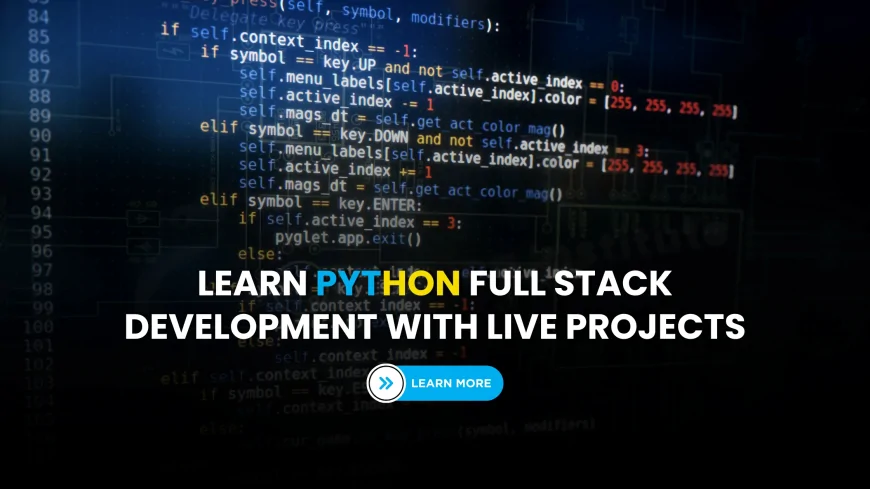Gain Real-World Skills with Full Stack Live Projects in Pune | Learn Full Stack Development by Doing Live Projects in Pune
Gain real-world skills with Full Stack development courses in Pune featuring live projects in Python, Django, and React. Build real applications, work with mentors, and create a job-ready portfolio.

Table of Contents
- Why Choose Live-Project Training?
- Skills & Technologies Covered
- Top Institutes in Pune
- Live Project Examples
- Mentorship & Peer Learning
- Career Benefits & Portfolios
- Course Format & Duration
- Fees & Financing
- Tips to Maximize Project Learning
- Frequently Asked Questions
- Conclusion
1. Why Choose Live‑Project Training?
- Practical Application: Renews learning over theory—working apps, real codebase.
- Problem-Solving Experience: Debugging, deployment, version control, user feedback cycles.
- Portfolio Building: Showcase ready-made projects to employers and clients.
- Team Collaboration: Develop communication and teamwork by simulating real dev environments.
- Career-Ready: Graduates with project experience are more employable and confident.
2. Skills & Technologies Covered
Typical full stack projects in Pune cover:
- Backend: Python, Django/Flask, REST frameworks, JSON, authentication
- Frontend: HTML5, CSS3, JavaScript | React.js, Redux or Vue.js
- Databases: PostgreSQL, MySQL, MongoDB
- DevOps: Docker, Git, GitHub workflows, CI/CD pipelines
- Cloud: AWS EC2, Heroku, Firebase, Netlify deployments
- Testing: Unit & integration tests with Pytest, Jest, Selenium
- Project Management: Agile, Trello/Jira basics
3. Top Institutions in Pune Offering Live Projects
- 1. WebAsha Technologies – Chandan nagar, Pune
One of the most trusted training centers in Pune, WebAsha Technologies offers full stack developer programs that are deeply project-oriented. Key highlights include:- Live projects on Django + React (e-commerce, blog, admin dashboards)
- Cloud deployment practice using Heroku or AWS
- Agile development process simulation during projects
- Placement assistance and GitHub portfolio reviews
4. Live Project Examples You’ll Build
- E-commerce Platform: Shopping cart, payment simulation, admin panel
- Blog CMS: Post creation, user auth, comment moderation
- Task & To‑Do Manager: CRUD operations, user roles, notifications
- Social Media Prototype: Messaging, feeds, likes, follows
- Dashboard Analytics: Data visuals using Chart.js or Plotly
- Chat App: Real-time data with WebSocket or Socket.io
5. Mentorship & Peer Learning
- 1:1 Mentorship: Code reviews, feedback loops usually weekly.
- Pair Programming: Work in teams on shared tasks and peer-review code.
- Group Demos: Present your project, get feedback from instructors & peers.
- Community Access: Slack/Discord workspace for doubt resolution and continued learning.
6. Career Benefits & Portfolios
Your live project portfolio helps you:
- Stand out in job applications by showcasing live apps
- Demonstrate technical depth during interviews with project walkthroughs
- Freelance or consultant roles using real project experience
- Blog or open source your project to contribute and network
7. Course Format & Duration
- Full-Time Bootcamp: 5 days/week, 16–20 weeks for intensive learning
- Part-Time/Weekend: 16–24 weeks, balanced pace for working learners
- Hybrid: Mix of classroom and online live sessions
- Self-Paced + Mentorship: Flexible timelines with regular touchpoints
8. Fees & Financing
- Fee Range: ₹30,000 to ₹90,000 depending on depth and mentorship
- EMI Plans: Available with most institutes, 3–12 month options
- Deferred/Outcome-Based: Some offer pay-after-placement models
- Scholarships & Discounts: For early birds, women, students
9. Tips to Maximize Project Learning
- Contribute meaningful features rather than just minimal work
- Write documentation, Clean code, follow best practices and tests
- Present your project via demos, write-ups, GitHub README
- Deploy your app publicly and monitor using dashboards or analytics
- Iterate based on user feedback—simulate Agile sprints
- Engage with peers, ask for reviews, and mentor newcomers
Frequently Asked Questions (FAQs)
1. Do these courses require prior coding experience?
Not necessarily. Many start with fundamentals before building projects.
2. Will I get a live mentor?
Yes—weekly 1:1 or group mentoring is standard in these programs.
3. Are the projects deployable and public?
Yes—you’ll deploy to Heroku, AWS, or Netlify so employers can view live demos.
4. How long are these programs?
Typically 14–20 weeks, depending on format and depth.
5. Can working professionals attend?
Yes—weekend and evening options are available for part-time learners.
6. How are the batches structured?
Batches are often 10–20 students with small group collaboration.
7. Do you build multiple projects?
Yes—usually 2–4 real-world projects across different domains.
8. Will I learn DevOps basics?
Yes—Docker, Git, CI/CD and cloud deployment are part of project workflows.
9. How much coding effort per week?
Expect to spend 10–20 hours coding, including sprint cycles and debugging.
10. Is this enough for job readiness?
Absolutely—live project experience is what employers seek in developers.
11. What kind of portfolios will I have?
Fully functional web apps with source code, live demos, and documentation.
12. Can I work on my own project idea?
Many institutes allow capstone customization to include your unique idea.
13. Is team collaboration included?
Yes—pair programming and peer code reviews are integral to the experience.
14. What if I miss a class?
Recorded sessions and make-up mentoring are usually available.
15. Are test-driven practices taught?
Yes—most programs include unit testing, integration tests, and CI setup.
16. Do institutes guarantee placement?
Many offer placement support, though some defer fees post-placement.
17. Can I freelance after this?
Definitely—live projects equip you for freelancing or remote roles.
18. What makes these better than regular courses?
The hands-on, real-app experience separates you from theory-only learners.
19. How are institute choices different?
Some focus on Python-React, others include DevOps or full stack specialties.
20. How do I start?
Choose a mentor-led, project-based course, check past student demos, and align schedule with your time.
Conclusion
Opting for full stack training with live projects in Pune propels you beyond theoretical learning into practical developer readiness. With real-world applications, backed by mentorship and portfolio outcomes, you’re job-ready and confident. Institutes like WebAsha provide structured, hands-on environments tailored for real-world success. Start your full stack journey with live projects and accelerate your career today.
What's Your Reaction?
 Like
0
Like
0
 Dislike
0
Dislike
0
 Love
0
Love
0
 Funny
0
Funny
0
 Angry
0
Angry
0
 Sad
0
Sad
0
 Wow
0
Wow
0














